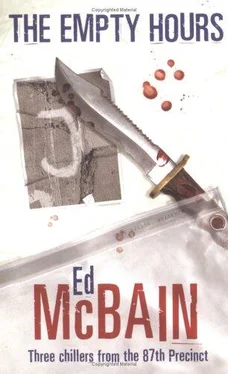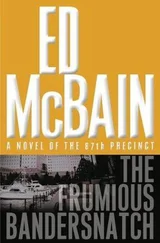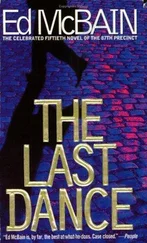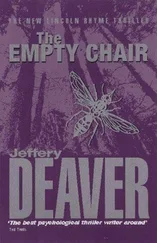Miraculously, the jaw did not break. Finch collided with the closet, grabbed the door behind him with both hands opened wide and flat against the wood, and then shook his head. He blinked his eyes and shook his head again. By what seemed to be sheer will power, he managed to stand erect without falling on his face.
Meyer stood watching him, saying nothing, breathing hard. Carella, who had come into the room, stood at the far end, ready to shoot Finch if he so much as raised a pinky.
“Your name Finch?” Meyer asked.
“I don’t talk to Jews,” Finch answered.
“Then try me,” Carella said. “What’s your name?”
“Go to hell, you and your Jewboy friend both.”
Meyer did not raise his voice. He simply took a step closer to Finch, and very softly said, “Mister, in two minutes, you’re gonna be a cripple because you resisted arrest.”
He didn’t have to say anything else, because his eyes told the full story, and Finch was a fast reader.
“Okay,” Finch said, nodding. “That’s my name.”
“What’s in the closet, Finch?” Carella asked.
“My clothes.”
“Get away from the door.”
“What for?”
Neither of the cops answered. Finch studied them for ten seconds, and quickly moved away from the door. Meyer opened it. The closet was stacked high with piles of tied and bundled pamphlets. The cord on one bundle was untied, the pamphlets spilling onto the closet floor. Apparently, this bundle was the one Finch had thrown into the closet when he’d heard the knock on the door. Meyer stooped and picked up one of the pamphlets. It was badly and cheaply printed, but the intent was unmistakable. The title of the pamphlet was “The Bloodsucker Jew.”
“Where’d you get this?” Meyer asked.
“I belong to a book club,” Finch answered.
“There are a few laws against this sort of thing,” Carella said.
“Yeah?” Finch answered. “Name me one.”
“Happy to. Section 1340 of the Penal Law — libel defined.”
“Maybe you ought to read Section 1342,” Finch said. “ ‘The publication is justified when the matter charged as libelous is true, and was published with good motives and for justifiable ends.’“
“Then let’s try Section 514,” Carella said. “‘A person who denies or aids or incites another to deny any person because of race, creed, color or national origin…’“
“I’m not trying to incite anyone,” Finch said, grinning.
“Nor am I a lawyer,” Carella said. “But we can also try Section 700, which defines discrimination, and Section 1430, which makes it a felony to perform an act of malicious injury to a place of religious worship.”
“Huh?” Finch said.
“Yeah,” Carella answered.
“What the hell are you talking about?”
“I’m talking about the little paint job you did on the synagogue wall.”
“What paint job? What synagogue?”
“Where were you at eight o’clock tonight, Finch?”
“Out.”
“Where?”
“I don’t remember.”
“You better start remembering.”
“Why? Is there a section of the Penal Law against loss of memory?”
“No,” Carella said. “But there’s one against homicide.”
The team stood around him in the squadroom.
The team consisted of Detectives Steve Carella., Meyer Meyer, Cotton Hawes., and Bert Kling. Two detectives from Homicide South had put in a brief appearance to legitimize the action, and then went home to sleep, knowing full well that the investigation of a homicide is always left to the precinct discovering the stiff. The team stood around Finch in a loose semicircle. This wasn’t a movie sound stage, so there wasn’t a bright light shining in Finch’s eyes, nor did any of the cops lay a finger on him. These days, there were too many smart-assed lawyers around who were ready and able to leap upon irregular interrogation methods when and if a case finally came to trial. The detectives simply stood around Finch in a loose, relaxed semicircle, and their only weapons were a thorough familiarity with the interrogation process and with each other, and the mathematical superiority of four minds pitted against one.
“What time did you leave the apartment?” Hawes asked.
“Around seven.”
“And what time did you return?” Kling asked.
“Nine, nine-thirty. Something like that.”
“Where’d you go?” Carella asked.
“I had to see somebody.”
“A rabbi?” Meyer asked.
“No.”
“Who?”
“I don’t want to get anybody in trouble.”
“You’re in plenty of trouble yourself,” Hawes said. “Where’d you go?”
“No place.”
“Okay, suit yourself,” Carella said. “You’ve been shooting your mouth off about killing Jews, haven’t you?”
“I never said anything like that.”
“Where’d you get these pamphlets?”
“I found them.”
“You agree with what they say?”
“Yes.”
“You know where the synagogue in this neighborhood is?”
“Yes.”
“Were you anywhere near it tonight between seven and nine?”
“No.”
“Then where were you?”
“No place.”
“Anybody see you there?” Kling asked.
“See me where?”
“The no place you went to.”
“Nobody saw me.”
“You went no place,” Hawes said, “and nobody saw you. Is that right?”
“That’s right.”
“The invisible man,” Kling said.
“That’s right.”
“When you get around to killing all these Jews,” Carella said, “how do you plan to do it?”
“I don’t plan to kill anybody,” he said defensively.
“Who you gonna start with?”
“Nobody.”
“Ben-Gurion?”
“Nobody.”
“Or maybe you’ve already started.”
“I didn’t kill anybody, and I’m not gonna kill anybody. I want to call a lawyer.”
“A Jewish lawyer?”
“I wouldn’t have—”
“What wouldn’t you have?”
“Nothing.”
“You like Jews?”
“No.”
“You hate them?’
“No.”
“Then you like them.’
“No, I didn’t say —’
“You either like them or you hate them. Which?”
“That’s none of your goddamn business!”
“But you agree with the crap in those hate pamphlets., don’t you?”
“They’re not hate pamphlets.”
“What do you call them?”
“Expressions of opinion.”
“Whose opinions?”
“Everybody’s opinion!”
“Yours included?”
“Yes, mine included!”
“Do you know Rabbi Solomon?”
“No.”
“What do you think of rabbis in general?”
“I never think of rabbis.”
“But you think of Jews a lot, don’t you?”
“There’s no crime about think—”
“If you think of Jews you must think of rabbis. Isn’t that right?”
“Why should I waste my time —”
“The rabbi is the spiritual leader of the Jewish people, isn’t he?”
“I don’t know anything about rabbis.”
“But you must know that.”
“What if I do?”
“Well, if you said you were going to kill the Jews —”
“I never said —”
“— then a good place to start would be with —”
“I never said anything like that!”
“We’ve got a witness who heard you! A good place to start would be with a rabbi, isn’t that so?”
“Go shove your rabbi —”
“Where were you between seven and nine tonight?”
“No place.”
“You were behind that synagogue, weren’t you?”
“No.”
“You were painting a J on the wall, weren’t you?”
“No! No, I wasn’t!”
Читать дальше












